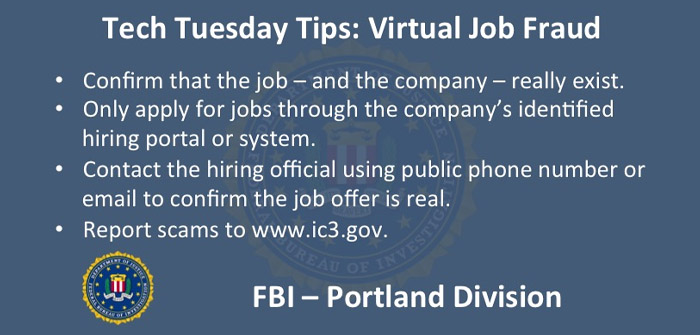Last week we talked about some work-at-home job scams where the bad guy convinces you to deposit a bogus check into your account and transfer funds back to him. This week, we are going to dive deeper into another kind of employment scam that we have been hearing about lately – this one has the scam artist spoofing a real employer with what looks like real jobs.
In this fraud scheme job seekers find a post on a job listing site or they receive what looks to be a legitimate email telling them that there is a high-paying job available. These jobs are often “virtual customer care” kind of positions – meaning you can work remotely. The scammer may even direct the potential employee to a real job posting on a reputable company’s website so that he or she can review the job requirements.
The original email often includes the real name and title of an executive or hiring officer. In some cases, the applicant may even receive a letter with the real CEO’s name on offering him or her a job.
We’ve had reports that the scammer directs the applicant to set up a Google account, if they don’t already have one, and a Google Hangout screen name. Using Google Hangout, the scam artist conducts a virtual job interview. Through that chat session, the bad guy gathers plenty of personal info that you would expect to give to a new employer, including your Social Security number, driver’s license number and the like. He can now set up bank accounts, open credit cards and more thanks to the info you gave up in your phony interview.
How do you protect yourself?
- Start by confirming that the job – and the company – really exist. Look for a public-facing website or other public info that verifies its legitimacy.
- If you see a job listed, apply through the company’s identified hiring portal – don’t allow the scammer to convince you that you can get hired faster going through him.
- Call or email the hiring officer directly using contact info available on the company’s website to confirm the job offer is real.
- Be wary if someone is using a free account – such as a Gmail or Yahoo email address – to communicate with you.
If you have been victimized by an online scam, report your suspicious contacts to the FBI. You can file an online report at the FBI’s Internet Crime Complaint Center at www.ic3.gov or call your FBI local office.





